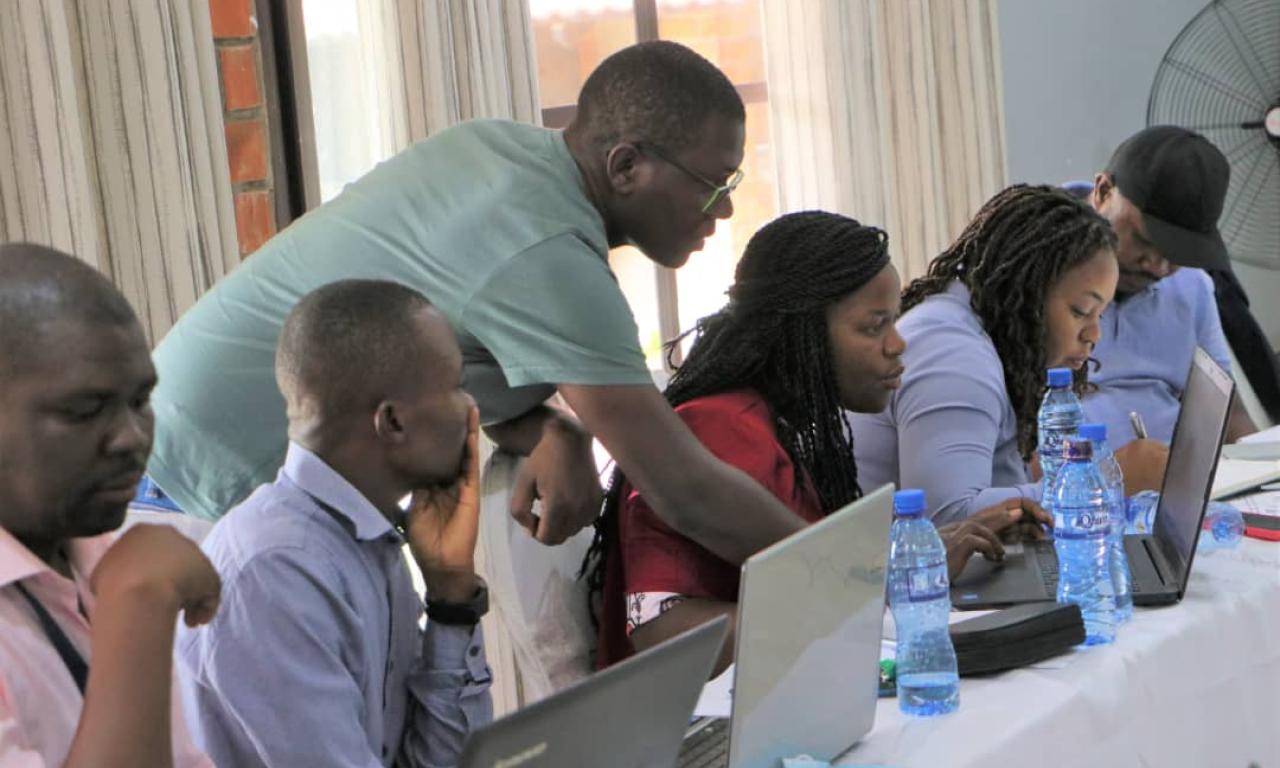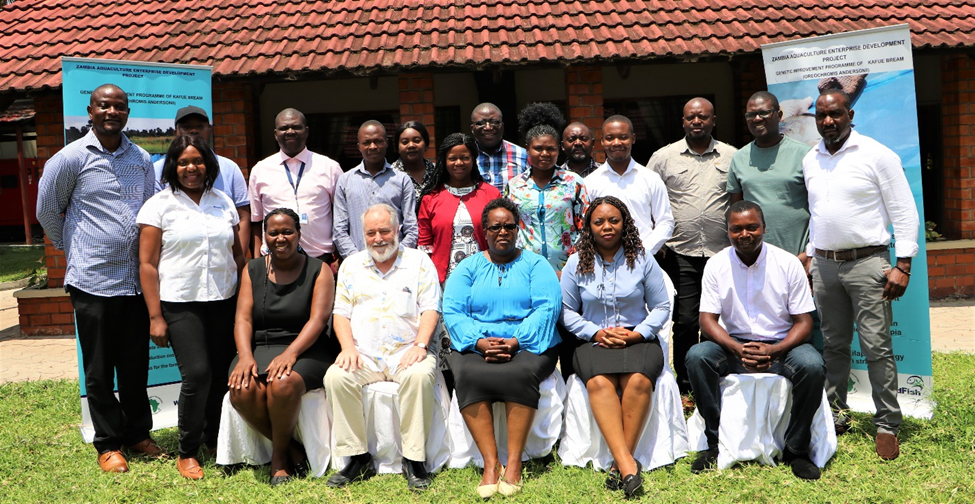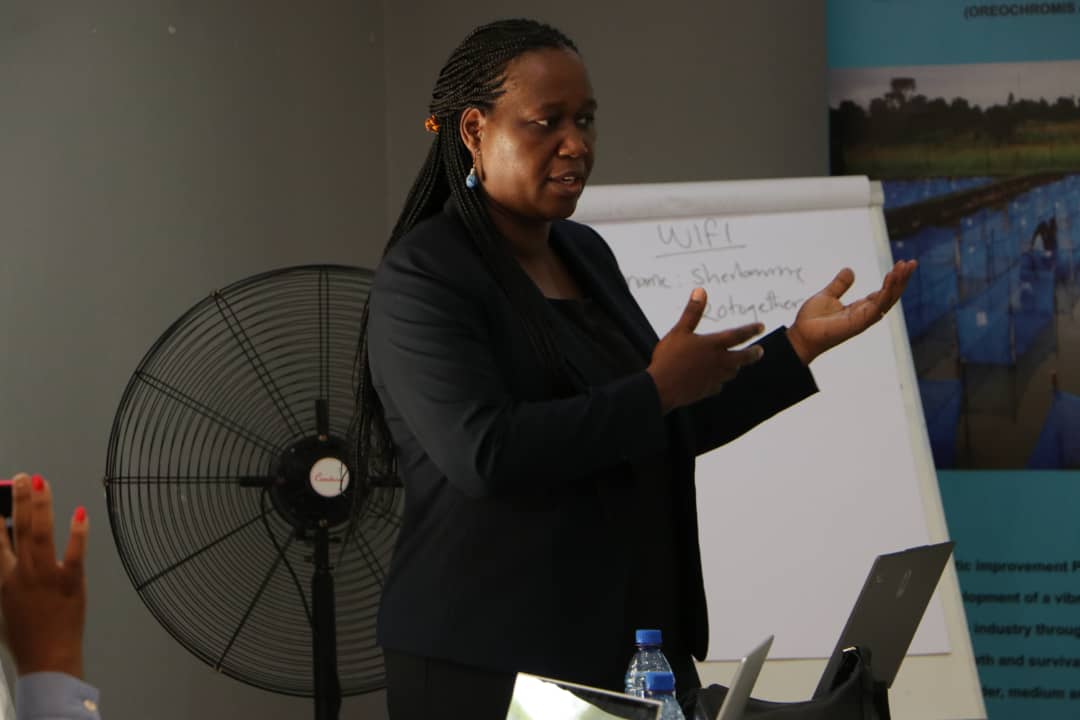
- A WorldFish training gave Zambian Government Officers insights into key issues to consider when starting an effective Genetic Improvement Program. The capacity development training included general management of fish breeding programs, phenotypic data reading, capturing and archiving, and Identification of breeding candidates.
- Having a diverse founder stock is one of the important factors to consider when starting a GIP project.
- One of the crucial skills in a fish Genetic Improvement Program (GIP) is accurate reading and recording of large sets of fish phenotypic data.
An intensive two-day training workshop on Tilapia genetics analysis in the Copperbelt province of Zambia was held by WorldFish recently. The training gave insights into key issues to consider when starting an effective Genetic Improvement Program (GIP) and trained participants in identifying breeding candidates using Estimated Breeding Values (EBVs) for a pedigree-based program. Prof. John Benzie, (WorldFish, Penang), Dr. Rose Komugisha Basiita, (WorldFish, Zambia), and Dr. Robert Mukibii, (Edinburgh University, UK) conducted the training.
The training included sixteen Department of Fisheries (DoF) staff from different fisheries stations including Lusaka, Chipata, Mongu, Kaoma, Solwezi, Kasama, Mungwi, and Minsamfu.
“The training has helped me to understand how to handle fish genetics data in Excel before it is analyzed. It has also helped me to know how to install and use R (a statistical data handling tool) to create pedigree files.” Sambiana Samwaka, Fisheries Technical Officer at Misamfu Aquaculture Research Station commented. Adding that she appreciated the knowledge gained on using command-based programs for genetics-related work.
Sauti Kalima an Aquaculture Research Officer, at Chipata Aquaculture Research Station, explained that he learnt that having a diverse founder stock is one of the important factors to consider when starting a GIP project, adding that this helps to ensure that there is enough genetic diversity and variation and helps reduce inbreeding over time.
During the initial phase of the program, WorldFish organized a GIP exposure trip to Bangladesh and Malaysia for some DoF officers who were to be involved in the GIP. WorldFish also supported the supervision of three ZAEDP-sponsored Master (MSc) students researching fish genetics.
Department of Fisheries officers have also benefitted from trainings conducted during the program’s implementation.

|
Continuous Capacity Building for Researchers for Program Sustainability
One of the crucial skills in a fish GIP is accurate reading and recording of the fish phenotypic data. In this regard, WorldFish and DoF staff at NARDC have worked together in measuring and recording phenotypic information using a device called a fish reader, which allows for more efficient capture of large data sets with reduced fish handling time. The fish reader training was conducted by Trovan (the fish reader manufacturer) and facilitated by WorldFish and the DoF.
“We have been using the fish reader through every population, and are now more consistent and efficient. It is very easy to work with and enables us to capture many data variables for lots of fish in a very short period” remarked Chad Kancheya, a DoF Aquaculture Research Officer who has been involved in the program from its onset. Throughout the program's implementation, DoF staff attached to the program have been exposed to several key genetic improvement activities and techniques.
Principle Aquaculture Research Officer (PARO) at the National Aquaculture Research and Development Center (NARDC) Mr. Edwin Kikamba, appreciated the knowledge and skills from the capacity-building activities that WorldFish through the GIP program imparted to DoF officers. He said this was crucial for the growth and development of the broader aquaculture sub-sector. He added that the knowledge and skills gained would be used in various government fisheries and aquaculture stations.
 |
WorldFish has been working with the Government of the Republic of Zambia through the Ministry of Fisheries and Livestock as a technical consultant to establish the improvement program of the local indigenous Three Spotted Tilapia, also called Kafue Bream. It is funded by the African Development Bank and the Government of Zambia and is an integral component of the Zambia Aquaculture Enterprise Development Project (ZAEDP).

